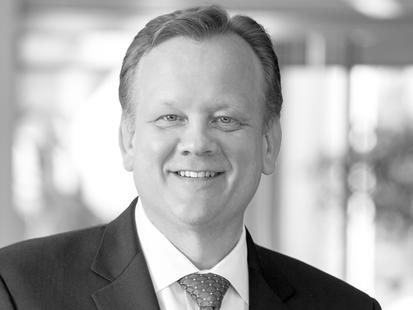
Greg Ergenbright
MBA ’93, President, Schindler Elevator Corp.
Industry
When Schindler Elevator Corp. President Greg Ergenbright (MBA ’93) saw that a UVA team had made it to the final round of his company’s urban design competition in Sao Paulo in April 2017, he said he was “extremely proud” as a Darden alumnus.
Ergenbright describes his company as one with a commitment “to global urbanization and innovation in mobility and sustainability in the future.” As an extension of that commitment, the North American subsidiary of Switzerland-based Schindler Group established the Schindler Global Award urban design competition in 2003 to motivate students and future architects to take into consideration issues of mobility and sustainability in current and future urban cities.
“My hopes for the awards,” Ergenbright said, “are that they drive the next generation to think about urban settings, to design the cities of the future. When you think about all of the complexities and challenges of extremely dense populations, mobility impacts everything. It impacts people’s exposure to nature and how they move freely from building to building. Even crime rates are impacted by urban design. Whether people have the ability to move around and interact freely impacts how people socialize — it really impacts everything. This competition is to engage architects to be future thinkers, and this kind of engagement will change the face of the future.”
While the Schindler Global Award is a current highlight for Ergenbright, his history in the transportation and mobility sector goes back to his earliest days after Darden. He earned a bachelor’s degree from Roanoke College in Virginia and his MBA from Darden in 1993. After earning his MBA, Ergenbright worked with another key player in the vertical transportation industry for 15 years before a four-year period as president and CEO of a private equity portfolio company. He was then recruited back into the vertical transportation field by Schindler, where he has served as president since 2013.
When was a time you realized the true value of your Darden education?
I realized the value of my Darden education before I even went to Darden. I knew that it would unlock many doors in the future that might have remained locked otherwise. A few professors from Roanoke College who were mentors to me really encouraged me to continue my education at Darden. Darden was a great experience — there were people from all over the country and the world, and having grown up in Virginia, it opened my eyes and gave me great exposure to diverse people and different mindsets. Some of the opportunities I’ve had post-Darden would have been unlikely for me without my education there. I’m really proud of my connection to the Darden community. As I get older, I’m always looking for ways to give back to Darden.
What were some early leadership lessons you learned?
Leadership, for me, really boils down to two things: attitude and dependability. As a leader of an organization, you set the tone, and I believe you do that through your attitude and your consistency. If people know that they can depend on you, then they can trust you. Attitude and trust — it’s really that basic. I learned this through experience — through how I responded to people who have led me. The adage is true: “To be a good leader, you must first be a good follower.” Whom are you inspired to follow? I paid attention to and followed the people who inspired me, and the people who inspired me were the people with a positive attitude in whom I trusted.
What motivates you in life?
What motivates me is feeling like I’m the luckiest man in the world. Waking up thankful for the life that I have keeps me grounded and keeps me going.
How do you measure success? What makes people successful?
People who don’t quit. The relentless pursuit of a goal. Whatever you want to call it, success happens for those who don’t quit.
What advice would you give to recent MBA graduates?
Don’t get too big for your britches. Your expectations for your future should revolve around your expectations of yourself. Expect a future you, not a future job; don’t base your expectations for your life on your degree. Be hardworking and committed to your pursuit. Life is a marathon, not a sprint — and Darden is just the five-mile mark on a 100-mile race. You still have a lot of running to do so be focused on the path in front of you and how you can make a difference along the way.